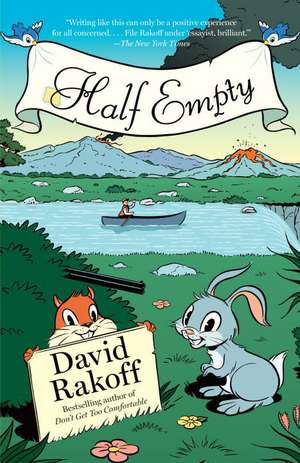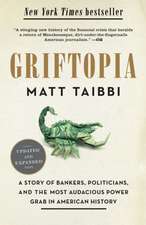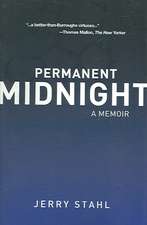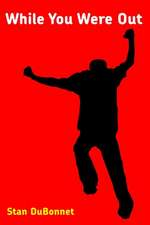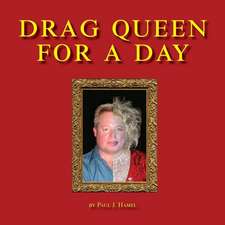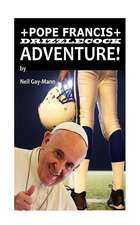Half Empty
Autor David Rakoffen Limba Engleză Paperback – 31 aug 2011
Vezi toate premiile Carte premiată
Preț: 101.99 lei
Nou
Puncte Express: 153
Preț estimativ în valută:
19.52€ • 21.21$ • 16.41£
19.52€ • 21.21$ • 16.41£
Carte disponibilă
Livrare economică 31 martie-14 aprilie
Preluare comenzi: 021 569.72.76
Specificații
ISBN-13: 9780767929059
ISBN-10: 0767929055
Pagini: 224
Dimensiuni: 135 x 202 x 18 mm
Greutate: 0.24 kg
Editura: Anchor Books
ISBN-10: 0767929055
Pagini: 224
Dimensiuni: 135 x 202 x 18 mm
Greutate: 0.24 kg
Editura: Anchor Books
Notă biografică
David Rakoff is the author of the books Fraud and Don’t Get Too Comfortable. A two-time recipient of the Lambda Literary Award, he is a regular contributor to Public Radio International’s This American Life. His writing has appeared in the New York Times, Newsweek, Wired, Salon, GQ, Outside, Gourmet, Vogue, Slate, Harper’s Bazaar, and the New York Observer, among other publications, and has been included in Da Capo’s Best Music Writing, The Best American Travel Writing as well as The Best American Non-Required Reading. He can be seen in the movies Capote (fleetingly), Strangers with Candy (fleetingly; mutely), and, most recently, he adapted the screenplay for and starred in Joachim Back’s film The New Tenants, which won the 2010 Oscar for Best Live Action Short.
Extras
The Bleak Shall Inherit
We were so happy. It was miserable.
Although it was briefly marvelous and strange to see a car parked outside an office, the wide hallway used like a street, many stories above the city.
The millennium had turned. The planes had not fallen from the sky, the trains had not careened off the tracks. Neither had the heart monitors, prenatal incubators, nor the iron lungs reset themselves to some suicidal zero hour to self-destruct in a lethal kablooey of Y2K shrapnel, as feared. And most important, the ATMs continued to dispense money, and what money it was.
I was off to see some of it. Like Edith Wharton's Gilded Age Buccaneers, when titled but cash-poor Europeans joined in wedlock with wealthy American girls in the market for pedigree, there were mutually abusive marriages popping up all over the city between un-moneyed creatives with ethereal Web-based schemes and the financiers who, desperate to get in on the action, bankrolled them. The Internet at that point was still newish and completely uncharted territory, to me, at least. I had walked away from a job at what would undoubtedly have been the wildly lucrative ground floor (1986, Tokyo) because it had seemed so boring, given my aggressive lack of interest in technology or machines, unless they make food. Almost fifteen years later, I was no more curious nor convinced, but now found myself at numerous parties for start-ups, my comprehension of which extended no further than the free snacks and drinks, and the perfume of money-scented elation in the air. The workings of "new media" remained entirely murky, and I a baffled hypocrite, scarfing down another beggar's purse with creme fraiche (flecked with just enough beads of caviar to get credit), pausing in my chewing only long enough to mutter "It'll never last." It was becoming increasingly difficult to fancy myself the guilelessly astute child at the procession who points out the emperor's nakedness as acquaintances were suddenly becoming millionaires on paper and legions of twenty-one-year-olds were securing lucrative and rewarding positions as "content providers" instead of answering phones for a living, as I had at that age. Brilliant success was all around.
So, so happy.
The surly Russian janitor (seemingly the only other New Yorker in a bad mood) rode me up in his dusty elevator in the vast deco building in the West Twenties, which was now home to cyber and design concerns that gravitated to its raw spaces and industrial cachet. The kind of place where the freight car and the corridors are both wide enough that you'd never have to get out of your Lexus until you'd parked it on the fourteenth floor.
Book publishing is always portrayed as teddibly genteel and literary: hunter-green walls, morocco-bound volumes, and some old codger in a waistcoat going on about dear Max Perkins. Worlds away from the reality of dropped-ceiling offices with seas of cubicles and mail-cart-scarred walls. But the Internet companies were coevolving with the fictionalized idealization of themselves. The way they looked in the movies was also how they looked in real life, much like real-life mobsters who now behave like the characters in the Godfather films.
The large industrial casement windows were masculine with grime, looking out over the rail yards on the open sky of West Side Manhattan. The content providers sat side by side at long metal trestle tables--the kind they use in morgues--providing content, the transparent turquoise bubbles of their iMacs shining like insect eyes. It was a painfully hip dystopia, some Orwellian Ministry of Malign Intent whose sheer stylishness made it a pleasure to be a chic and soulless drone; one's personal freedoms happily abrogated for a Hugo Boss jumpsuit.
I was there to interview the founders of a site that was to be the one stop where members of the media might log on to read about themselves and the latest magazine-world gossip, schadenfreude-laden items about hefty book advances and who was seen lunching at Michael's, etc. I will stipulate to a certain degree of prejudicial thinking before I even walked in. I expected a bunch of aphoristic, McLuhan-lite bushwa, something to justify the house-of-cards business model. But as a reporter, I was their target audience as well as a colleague. I was unprepared to be spoken to like an investor, as if I, too, were some venture capitalist who goes goggled-eyed and compliant at the mere mention of anything nonnumerical. I was being lubed up with snake oil, listening to a bunch of pronouncements that sounded definitive and guru-like on the surface but which upon examination seemed just plain old wrong.
"What makes a story really good and Webby," said one, "is, say, we post an item on David Geffen on a Monday, and then one of Geffen's people calls us to correct it, we can have a whole new version up by Tuesday." This was typical Dawn of the New Millennium denigration of print, which always seemed to lead to the faulty logic that it was not just the delivery system that was outmoded but such underlying practices as authoritative voice and credibility, fact-checking, editing, and impartiality that needed throwing out, too. It was a stance they both seemed a little old for, frankly, like watching a couple of forty-five-year-olds in backward baseball caps on skateboards. In the future, it seems, we would all take our editorial marching orders from the powerful subjects of our stories and it would be good (Right you are, Mr. Geffen!). It was a challenge to sit there and be told that caring about such things as journalistic independence or the desire to keep money's influence at even a show of remove meant one was clinging to old beliefs, a fossil in the making. Now that everything and everyone was palliated by the never-ending flow of revenue, there was no need to get exercised about such things, or about anything, really.
"We basically take John Seabrook's view that what you have is more important than what you believe. Whether you drive a Cadillac says more about you than if you're a Democrat or a Republican," said one, invoking a (print) journalist from The New Yorker.
Added the other: "That you watched The Sopranos last night is more important than who you voted for."
They weren't saying anything terribly incendiary. It's not like they were proposing tattooing people who have HIV the way odious William F. Buckley did (I'm sorry, I mean brilliant and courtly, such manners, and what a vocabulary! Nazi . . .). But we had just been through an electoral experience that had been bruising, to say the least. Who one voted for had almost never seemed more important, and they were saying it all so blithely. I felt like a wife who has caught her tobacco-and-gin-scented husband smeared in lipstick, a pair of silk panties sticking out of his jacket pocket, home after an unexplained three-day absence, listening to his giggling, sloppily improbable, and casually delivered alibi and being expected to swallow it while chuckling along.
We were silent for a moment, the only sound the keyboard tappings of the hipster minions. I finally managed to say, "I've just experienced the death of hope."
We all three laughed: me, in despair; them, all the way to the bank. Said one of them, "No, David. We are the very opposite. This is the birth of hope!"
Down in the rattling freight elevator. I couldn't face going home just then, where I would have to immediately relive this conversation by transcribing my tape. I turned right out of the building, crossed Eleventh Avenue, and sat on a concrete barrier facing the river. The cynicism of the interview, the lack of belief coupled with the enthusiastic tone in which the bullshit was being slung, the raiding-the-granaries greed dressed up in the cheap drag of some hollow dream of a Bright New Day of it all. The Hudson bleared and wobbled before my eyes, which were swimming with furious tears. I wasn't angry to the point of almost crying because they were wrong but because they were right.
It might seem a bit much to pin the woes of the age on the fairly modest landgrab of the two men I had just interviewed, but they were symptomatic of something. In blithe defiance of some very real evidence out there that we still had reason for some very real concern, rampant optimism, fueled by money and a maddening fingers-in-the-ears-can't-hear-you-lalala denial, was now carrying the day. There seemed no longer to be any room in the discourse for anything but the sunniest outlook.
Contrarianism needed restoring to its rightful stature as loyal opposition and so I found myself, some four months later, on my way to Wellesley College to interview a psychologist named Julie Norem.
Norem's book, The Positive Power of Negative Thinking, was about to come out and the same magazine, for whom I had shed my Hudson River tears, was now sending me to document this emotional market correction. It was one I welcomed, and judging from the title, one my editors were hoping--as editors must--would present as a forceful linchpin theory, a reductive cudgel of a book that would advocate wholesale crankiness, a call to arms that we all rain on each other's parades, piss in one another's cereal, kick puppies, and smack babies.
As the schoolgirl said to the vicar, it was a lot less meaty up close. The book was terrifically smart and well-wrought, but Norem had emphatically not written a book against happiness. Her research dealt with a specific kind of anxiety-management technique known as "defensive pessimism." Defensive pessimism is related to dispositional pessimism--that clinical, Eeyore-like negativity--but it is, at most, a first cousin. One who is kickier and more fun to be around; played by the same actress but with her glasses off, a different hairstyle, and a "visiting for the summer from swinging London" accent.
Both dispositional and defensive pessimists face life with that same negative prediction: "This [insert impending experience, encounter, endeavor here] will be a disaster." But where the dispositional pessimist sees that gloomy picture as a verdict and pretext to return to or simply remain in bed, the defensive pessimist uses it as the first of a three-part process: 1) the a priori lowered expectations (the previously mentioned presentiment of disaster) are followed by 2) a detailed breakdown of the situation (the "this will suck because . . ." stage), wherein one envisions the specific ways in which the calamity will take shape. A worst-case scenario painted in as much detail as possible. The process culminates in 3) coming up with the various responses and remedies to each possible misstep along the way ("I will arrive early and make sure the microphone cord is taped down," "I'll have my bear spray in my hand before I leave the cabin," "I'll put the Xanax under my tongue forty minutes before the party and pretend not to remember his name when I see him," etc.). A sea of troubles, opposed and ended, one nigglesome wave at a time. Defensive pessimism is about sweating the small stuff, being prepared for contingencies like some neurotic Jewish Boy Scout, and in so doing, not letting oneself be crippled by fear. Where a strategic optimist might approach a gathering rainstorm with a smile as his umbrella, the defensive pessimist, all too acquainted with this world of pitfall and precipitation, is far more likely to use, well, an umbrella.
This mental preparation is just an alternate means of coping with a world where--in the pessimist's view of reality--there is often little difference between "worst possible outcome" and "outcome." A world seen as worse than it actually is. Through such eyes, the optimist looks hopelessly naive. As Prohibition-era newspaperman Don Marquis put it in 1927, another age when unwarranted exuberance and eye-off-the-ball hubris led to its own inevitable disaster, "an optimist is a guy that has never had much experience." But Norem explains that optimists, too, have their own mental strategies of navigating a world that seems far better than it is in reality. They need to sustain a cognitive conundrum known as "ironic processing," a willful "whatever you do, don't think about it" ignorance, blind to even the possibility of negative outcome. In a study where subjects were made to play darts, defensive pessimists who were robbed of their time for mental rehearsal and instead made to relax, free of thought, were thrown off their game. Conversely, optimists also found their anxieties increase and their performances suffer by being made to contemplate strategy and contingency before taking aim.
It might seem that the twain shall never meet and at best one might achieve some grudging mutual understanding, but cognition and its styles exist on a continuum. Pessimists are born, true, but they also can be made. Two social psychologists out of Cornell named Justin Kruger and David Dunning bore this out to a degree in a study where they asked subjects to assess their skill levels in a number of areas, on which they would be tested. What they found was that those who scored lowest had rated themselves highest. The same held true in reverse: high-scoring subjects had underestimated their skills and how well they compared with others. When the over-raters received instruction, namely, when they became intrinsically more skilled than before, their sense of their own competence diminished. Experience had shown them how much more there was to learn, how far they still had to go, and their self-assessments reflected this.
Given all of this--that one need but point out the ways in which we were royally screwed to have the scales fall from people's eyes--how was it possible for Norem's book not to be the antidote to all the unchecked and unearned exuberance of the age? This volume would finally wake folks up, I thought. The bleak would inherit the earth!
(I had chosen that moment, it seems, to forget yet again my unique incapacity for identifying trends. If I think something is going to happen, it invariably results in the very opposite nonevent. Conversely, if I smell doom, there will be nothing but brilliant success. My finger is securely off the pulse. Walking away from the Internet in 1986 is just one instance in an illustrious resume of bad calls.
In 1982, as a freshman in college, during a brief and ultimately fruitless attempt at inhabiting my own skin, I went one evening to Danceteria, a club in downtown Manhattan. I didn't drink at the time, so there was nothing to buffer the noise, the dark, the crowded stairwells, the too-long wait for both the coat check and the urinals, and especially that evening's entertainment: a whiny, nasal girl in torn lace and rubber-gasket bracelets who bopped around to an over-synthesized and generic backbeat.
"Well, she's lousy," I thought to myself, happily envisioning my departure from this throbbing club, my subway ride uptown to my dorm room and bed, and this girl's return to the obscurity whence she sprung. The world, however, had different plans for Madonna. "Hey David, have you seen that fellow in the marketplace inveighing against the Pharisees and the money-changers? You know, the one who calls himself the Son of God?" "That idiot? He'll burn off like so much morning fog, mark my words . . ."
Bet against me, and I will make you rich. I am the un-canary in the mine shaft. (Gas? I don't smell no gas!)
From the Hardcover edition.
We were so happy. It was miserable.
Although it was briefly marvelous and strange to see a car parked outside an office, the wide hallway used like a street, many stories above the city.
The millennium had turned. The planes had not fallen from the sky, the trains had not careened off the tracks. Neither had the heart monitors, prenatal incubators, nor the iron lungs reset themselves to some suicidal zero hour to self-destruct in a lethal kablooey of Y2K shrapnel, as feared. And most important, the ATMs continued to dispense money, and what money it was.
I was off to see some of it. Like Edith Wharton's Gilded Age Buccaneers, when titled but cash-poor Europeans joined in wedlock with wealthy American girls in the market for pedigree, there were mutually abusive marriages popping up all over the city between un-moneyed creatives with ethereal Web-based schemes and the financiers who, desperate to get in on the action, bankrolled them. The Internet at that point was still newish and completely uncharted territory, to me, at least. I had walked away from a job at what would undoubtedly have been the wildly lucrative ground floor (1986, Tokyo) because it had seemed so boring, given my aggressive lack of interest in technology or machines, unless they make food. Almost fifteen years later, I was no more curious nor convinced, but now found myself at numerous parties for start-ups, my comprehension of which extended no further than the free snacks and drinks, and the perfume of money-scented elation in the air. The workings of "new media" remained entirely murky, and I a baffled hypocrite, scarfing down another beggar's purse with creme fraiche (flecked with just enough beads of caviar to get credit), pausing in my chewing only long enough to mutter "It'll never last." It was becoming increasingly difficult to fancy myself the guilelessly astute child at the procession who points out the emperor's nakedness as acquaintances were suddenly becoming millionaires on paper and legions of twenty-one-year-olds were securing lucrative and rewarding positions as "content providers" instead of answering phones for a living, as I had at that age. Brilliant success was all around.
So, so happy.
The surly Russian janitor (seemingly the only other New Yorker in a bad mood) rode me up in his dusty elevator in the vast deco building in the West Twenties, which was now home to cyber and design concerns that gravitated to its raw spaces and industrial cachet. The kind of place where the freight car and the corridors are both wide enough that you'd never have to get out of your Lexus until you'd parked it on the fourteenth floor.
Book publishing is always portrayed as teddibly genteel and literary: hunter-green walls, morocco-bound volumes, and some old codger in a waistcoat going on about dear Max Perkins. Worlds away from the reality of dropped-ceiling offices with seas of cubicles and mail-cart-scarred walls. But the Internet companies were coevolving with the fictionalized idealization of themselves. The way they looked in the movies was also how they looked in real life, much like real-life mobsters who now behave like the characters in the Godfather films.
The large industrial casement windows were masculine with grime, looking out over the rail yards on the open sky of West Side Manhattan. The content providers sat side by side at long metal trestle tables--the kind they use in morgues--providing content, the transparent turquoise bubbles of their iMacs shining like insect eyes. It was a painfully hip dystopia, some Orwellian Ministry of Malign Intent whose sheer stylishness made it a pleasure to be a chic and soulless drone; one's personal freedoms happily abrogated for a Hugo Boss jumpsuit.
I was there to interview the founders of a site that was to be the one stop where members of the media might log on to read about themselves and the latest magazine-world gossip, schadenfreude-laden items about hefty book advances and who was seen lunching at Michael's, etc. I will stipulate to a certain degree of prejudicial thinking before I even walked in. I expected a bunch of aphoristic, McLuhan-lite bushwa, something to justify the house-of-cards business model. But as a reporter, I was their target audience as well as a colleague. I was unprepared to be spoken to like an investor, as if I, too, were some venture capitalist who goes goggled-eyed and compliant at the mere mention of anything nonnumerical. I was being lubed up with snake oil, listening to a bunch of pronouncements that sounded definitive and guru-like on the surface but which upon examination seemed just plain old wrong.
"What makes a story really good and Webby," said one, "is, say, we post an item on David Geffen on a Monday, and then one of Geffen's people calls us to correct it, we can have a whole new version up by Tuesday." This was typical Dawn of the New Millennium denigration of print, which always seemed to lead to the faulty logic that it was not just the delivery system that was outmoded but such underlying practices as authoritative voice and credibility, fact-checking, editing, and impartiality that needed throwing out, too. It was a stance they both seemed a little old for, frankly, like watching a couple of forty-five-year-olds in backward baseball caps on skateboards. In the future, it seems, we would all take our editorial marching orders from the powerful subjects of our stories and it would be good (Right you are, Mr. Geffen!). It was a challenge to sit there and be told that caring about such things as journalistic independence or the desire to keep money's influence at even a show of remove meant one was clinging to old beliefs, a fossil in the making. Now that everything and everyone was palliated by the never-ending flow of revenue, there was no need to get exercised about such things, or about anything, really.
"We basically take John Seabrook's view that what you have is more important than what you believe. Whether you drive a Cadillac says more about you than if you're a Democrat or a Republican," said one, invoking a (print) journalist from The New Yorker.
Added the other: "That you watched The Sopranos last night is more important than who you voted for."
They weren't saying anything terribly incendiary. It's not like they were proposing tattooing people who have HIV the way odious William F. Buckley did (I'm sorry, I mean brilliant and courtly, such manners, and what a vocabulary! Nazi . . .). But we had just been through an electoral experience that had been bruising, to say the least. Who one voted for had almost never seemed more important, and they were saying it all so blithely. I felt like a wife who has caught her tobacco-and-gin-scented husband smeared in lipstick, a pair of silk panties sticking out of his jacket pocket, home after an unexplained three-day absence, listening to his giggling, sloppily improbable, and casually delivered alibi and being expected to swallow it while chuckling along.
We were silent for a moment, the only sound the keyboard tappings of the hipster minions. I finally managed to say, "I've just experienced the death of hope."
We all three laughed: me, in despair; them, all the way to the bank. Said one of them, "No, David. We are the very opposite. This is the birth of hope!"
Down in the rattling freight elevator. I couldn't face going home just then, where I would have to immediately relive this conversation by transcribing my tape. I turned right out of the building, crossed Eleventh Avenue, and sat on a concrete barrier facing the river. The cynicism of the interview, the lack of belief coupled with the enthusiastic tone in which the bullshit was being slung, the raiding-the-granaries greed dressed up in the cheap drag of some hollow dream of a Bright New Day of it all. The Hudson bleared and wobbled before my eyes, which were swimming with furious tears. I wasn't angry to the point of almost crying because they were wrong but because they were right.
It might seem a bit much to pin the woes of the age on the fairly modest landgrab of the two men I had just interviewed, but they were symptomatic of something. In blithe defiance of some very real evidence out there that we still had reason for some very real concern, rampant optimism, fueled by money and a maddening fingers-in-the-ears-can't-hear-you-lalala denial, was now carrying the day. There seemed no longer to be any room in the discourse for anything but the sunniest outlook.
Contrarianism needed restoring to its rightful stature as loyal opposition and so I found myself, some four months later, on my way to Wellesley College to interview a psychologist named Julie Norem.
Norem's book, The Positive Power of Negative Thinking, was about to come out and the same magazine, for whom I had shed my Hudson River tears, was now sending me to document this emotional market correction. It was one I welcomed, and judging from the title, one my editors were hoping--as editors must--would present as a forceful linchpin theory, a reductive cudgel of a book that would advocate wholesale crankiness, a call to arms that we all rain on each other's parades, piss in one another's cereal, kick puppies, and smack babies.
As the schoolgirl said to the vicar, it was a lot less meaty up close. The book was terrifically smart and well-wrought, but Norem had emphatically not written a book against happiness. Her research dealt with a specific kind of anxiety-management technique known as "defensive pessimism." Defensive pessimism is related to dispositional pessimism--that clinical, Eeyore-like negativity--but it is, at most, a first cousin. One who is kickier and more fun to be around; played by the same actress but with her glasses off, a different hairstyle, and a "visiting for the summer from swinging London" accent.
Both dispositional and defensive pessimists face life with that same negative prediction: "This [insert impending experience, encounter, endeavor here] will be a disaster." But where the dispositional pessimist sees that gloomy picture as a verdict and pretext to return to or simply remain in bed, the defensive pessimist uses it as the first of a three-part process: 1) the a priori lowered expectations (the previously mentioned presentiment of disaster) are followed by 2) a detailed breakdown of the situation (the "this will suck because . . ." stage), wherein one envisions the specific ways in which the calamity will take shape. A worst-case scenario painted in as much detail as possible. The process culminates in 3) coming up with the various responses and remedies to each possible misstep along the way ("I will arrive early and make sure the microphone cord is taped down," "I'll have my bear spray in my hand before I leave the cabin," "I'll put the Xanax under my tongue forty minutes before the party and pretend not to remember his name when I see him," etc.). A sea of troubles, opposed and ended, one nigglesome wave at a time. Defensive pessimism is about sweating the small stuff, being prepared for contingencies like some neurotic Jewish Boy Scout, and in so doing, not letting oneself be crippled by fear. Where a strategic optimist might approach a gathering rainstorm with a smile as his umbrella, the defensive pessimist, all too acquainted with this world of pitfall and precipitation, is far more likely to use, well, an umbrella.
This mental preparation is just an alternate means of coping with a world where--in the pessimist's view of reality--there is often little difference between "worst possible outcome" and "outcome." A world seen as worse than it actually is. Through such eyes, the optimist looks hopelessly naive. As Prohibition-era newspaperman Don Marquis put it in 1927, another age when unwarranted exuberance and eye-off-the-ball hubris led to its own inevitable disaster, "an optimist is a guy that has never had much experience." But Norem explains that optimists, too, have their own mental strategies of navigating a world that seems far better than it is in reality. They need to sustain a cognitive conundrum known as "ironic processing," a willful "whatever you do, don't think about it" ignorance, blind to even the possibility of negative outcome. In a study where subjects were made to play darts, defensive pessimists who were robbed of their time for mental rehearsal and instead made to relax, free of thought, were thrown off their game. Conversely, optimists also found their anxieties increase and their performances suffer by being made to contemplate strategy and contingency before taking aim.
It might seem that the twain shall never meet and at best one might achieve some grudging mutual understanding, but cognition and its styles exist on a continuum. Pessimists are born, true, but they also can be made. Two social psychologists out of Cornell named Justin Kruger and David Dunning bore this out to a degree in a study where they asked subjects to assess their skill levels in a number of areas, on which they would be tested. What they found was that those who scored lowest had rated themselves highest. The same held true in reverse: high-scoring subjects had underestimated their skills and how well they compared with others. When the over-raters received instruction, namely, when they became intrinsically more skilled than before, their sense of their own competence diminished. Experience had shown them how much more there was to learn, how far they still had to go, and their self-assessments reflected this.
Given all of this--that one need but point out the ways in which we were royally screwed to have the scales fall from people's eyes--how was it possible for Norem's book not to be the antidote to all the unchecked and unearned exuberance of the age? This volume would finally wake folks up, I thought. The bleak would inherit the earth!
(I had chosen that moment, it seems, to forget yet again my unique incapacity for identifying trends. If I think something is going to happen, it invariably results in the very opposite nonevent. Conversely, if I smell doom, there will be nothing but brilliant success. My finger is securely off the pulse. Walking away from the Internet in 1986 is just one instance in an illustrious resume of bad calls.
In 1982, as a freshman in college, during a brief and ultimately fruitless attempt at inhabiting my own skin, I went one evening to Danceteria, a club in downtown Manhattan. I didn't drink at the time, so there was nothing to buffer the noise, the dark, the crowded stairwells, the too-long wait for both the coat check and the urinals, and especially that evening's entertainment: a whiny, nasal girl in torn lace and rubber-gasket bracelets who bopped around to an over-synthesized and generic backbeat.
"Well, she's lousy," I thought to myself, happily envisioning my departure from this throbbing club, my subway ride uptown to my dorm room and bed, and this girl's return to the obscurity whence she sprung. The world, however, had different plans for Madonna. "Hey David, have you seen that fellow in the marketplace inveighing against the Pharisees and the money-changers? You know, the one who calls himself the Son of God?" "That idiot? He'll burn off like so much morning fog, mark my words . . ."
Bet against me, and I will make you rich. I am the un-canary in the mine shaft. (Gas? I don't smell no gas!)
From the Hardcover edition.
Recenzii
“Writing like this can only be a positive experience for all concerned. . . . File Rakoff under ‘essayist, brilliant.’” —The New York Times
“Some people believe in the power of positive thinking. The rest of us believe in David Rakoff.” —Daily Candy
“Tough, suave, dry, and very funny.” —The Paris Review
“Rakoff wanders among our cultural myths, piercing them with a finely sharpened sarcasm. . . . As Rakoff tenderly probes his fears, he makes clear that for all his detachment, he is part of our tribe. He’s just funnier than most of us.” —The Miami Herald
“A pure pleasure to read.” —The Observer’s Very Short List
“One of our funniest writers.” —People
“Right now, this country is brimming over with kindness—some real, some feigned. It is wit, unfeigned, that is gasping for air. . . . For the sake of the future, come back soon, David Rakoff.” —San Francisco Chronicle
“Full of wit.” —NPR, “Fresh Air”
“Rakoff can issue a withering snark with the best of them. But once his rapier wit has sliced the buttons off his target’s clothing, revealing the quivering, vulnerable mass within, his fundamental sense of decency gets the best of him.” —Salon
“Half Empty balances its darker aspects with wickedly amusing takes on a variety of subjects.” —The Toronto Star
“If you love the personal essay, you’ll love David Rakoff’s musings.” —The Baltimore Sun
“Rakoff is so keenly observant and dead-on with his criticism, you get the impression most of our eyes would cross and cartoon birds fly above our heads before we could make it halfway to the elegant, smart conclusions he draws. . . . A writerly collection to make giddy even the most erudite lover of words. An undisputed KO for negative thinking.” —Booklist
“Rakoff manages to make pessimism sexy. . . . While Rakoff seems to revel in his role as a modern-day Thomas Hobbes, it’s evident that he remains responsible in his critique, never trouncing a subject without provocation while simultaneously opening the reader’s eyes to everyday lunacy.” —Kirkus Reviews
“Some people believe in the power of positive thinking. The rest of us believe in David Rakoff.” —Daily Candy
“Tough, suave, dry, and very funny.” —The Paris Review
“Rakoff wanders among our cultural myths, piercing them with a finely sharpened sarcasm. . . . As Rakoff tenderly probes his fears, he makes clear that for all his detachment, he is part of our tribe. He’s just funnier than most of us.” —The Miami Herald
“A pure pleasure to read.” —The Observer’s Very Short List
“One of our funniest writers.” —People
“Right now, this country is brimming over with kindness—some real, some feigned. It is wit, unfeigned, that is gasping for air. . . . For the sake of the future, come back soon, David Rakoff.” —San Francisco Chronicle
“Full of wit.” —NPR, “Fresh Air”
“Rakoff can issue a withering snark with the best of them. But once his rapier wit has sliced the buttons off his target’s clothing, revealing the quivering, vulnerable mass within, his fundamental sense of decency gets the best of him.” —Salon
“Half Empty balances its darker aspects with wickedly amusing takes on a variety of subjects.” —The Toronto Star
“If you love the personal essay, you’ll love David Rakoff’s musings.” —The Baltimore Sun
“Rakoff is so keenly observant and dead-on with his criticism, you get the impression most of our eyes would cross and cartoon birds fly above our heads before we could make it halfway to the elegant, smart conclusions he draws. . . . A writerly collection to make giddy even the most erudite lover of words. An undisputed KO for negative thinking.” —Booklist
“Rakoff manages to make pessimism sexy. . . . While Rakoff seems to revel in his role as a modern-day Thomas Hobbes, it’s evident that he remains responsible in his critique, never trouncing a subject without provocation while simultaneously opening the reader’s eyes to everyday lunacy.” —Kirkus Reviews
Premii
- Thurber Prize for American Humor Winner, 2011
